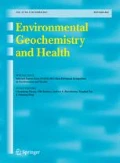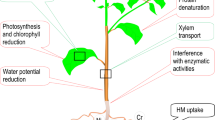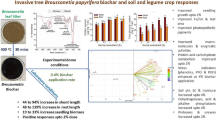Abstract
Lindane and DDT (1,1,1-trichloro-2,2-bis(4-chlorophenyl)ethane) are pesticides from the group of persistent organic pollutants. These compounds, due to lipophilic properties, accumulate in tissues of organisms, are transmitted through the food chain and ultimately threaten human health. The long-term use of pesticides led to soil and water pollution. Microbial degradation of organochlorine compounds is the most eco-friendly method of polluted soil recultivation. Effective degradation of lindane and DDT soil pollution under the influence of introduced destructive bacteria was shown in the laboratory conditions. The concentration of lindane in the soil decreased by 75% and of DDT-by 56% in 30 days. The red clover seedlings increased pesticides degradation in the soil by 20%. The destruction of pesticides in soil was more intense than in the mineral medium. The DGGE analysis of microorganism associations introduced in contaminated soil was possible to follow the survival of the introduced associations. The use of microorganisms-destructors of organochlorine compounds, and plants as well as the biodegradation potential of the soil is a promising direction in the recultivation of polluted soils.



Similar content being viewed by others
References
Abhilash, P. C., Srivastava, S., & Nandita, S. N. (2011). Comparative bioremediation potential of four rhizospheric microbial species against lindane. Chemosphere, 82(1), 56–63. https://doi.org/10.1016/j.chemosphere.2010.10.009.
Ahuja, R., & Kumar, A. (2003). Metabolism of DDT [1,1,1-Trichloro-2,2-bis(4-chlorophenyl)ethane] by Alcaligenes denitrificans ITRC-4 under Aerobic and Anaerobic conditions. Current Microbiology, 46(1), 65–69. https://doi.org/10.1007/s00284-002-3819-1.
Álvarez, A., Yañez, M. L., Benimeli, C. S., Saez, J. M., Giuliano, A., & Amoroso, M. J. (2012). Lindane removal using Streptomyces strains and maize plants: A biological system for reducing pesticides in soils. International Biodeterioration & Biodegradation, 66, 14–18. https://doi.org/10.3390/ijms131115086.
Amirova, Z. K., & Speranskaya, O. A. (2016). New persistent organic supertoxicants and their impact on human health. Moscow: Eco-Consent Center Publishing House.
Benimeli, C. S., Fuentesa, M. S., Abate, C. M., & Amoroso, M. J. (2008). Bioremediation of lindane-contaminated soil by Streptomyces sp. M7 and its effects on Zea mays growth. International Biodeterioration & Biodegradation, 61, 233–239. https://doi.org/10.1016/j.ibiod.2007.09.001.
Bertani, G. (1951). Studies orn lysogenesis. I. The mode of phage liberation by lysogenic Escherichia coli. Journal of Bacteriology, 62, 293–300.
Bharagava, R. N. (2017). Environmental pollutants and their bioremediation approaches. Florida: CRC Press.
Cébron, A., Louvel, B., Faure, P., France-Lanord, C., Chen, Y., Murrell, J. C., & Leyval, C. (2011). Root exudates modify bacterial diversity of phenanthrene degraders in PAH-polluted soil but not phenanthrene degradation rates. Environmental Microbiology, 13(3), 722–736. https://doi.org/10.1111/j.1462-2920.2010.02376.x.
Chauhan, A., & Singh, J. (2015). Biodegradation of DDT. J Textile Sci Eng, 5, 1. https://doi.org/10.4172/2165-8064.1000183.
Curl, E. A., & Truelove, B. (1986). The Rhizosphere (p. 288). Berlin: Springer.
Damborsky, J., Nagata, Y., Trinh, T., Kang, J., Turnbull, M. (2017). Gamma-Hexachlorocyclohexane Graphical Pathway Map. EAWAG http://eawag-bbd.ethz.ch/ghch/ghch_image_map.html
Database of chemical compounds. (2019). NCBI Pubchem: https://pubchem.ncbi.nlm.nih.gov
Egorova, D. O., Farofonova, V. V., Andreev, D. N., Buzmakov, S. A., & Demakov, V. A. (2017). Communities of aerobic bacteria of DDT destructors as a result of natural and artificial selection. Izv Saratov Uni New Ser Chemistry Biology Ecology, 17(1), 79–86.
EzBioCloud Database. (2019). https://www.ezbiocloud.net/
Foght, J., April, T., Biggar, K., & Aislabie, J. (2001). Bioremediation of DDT-contaminated soils: A review. Bioremediation Journal, 5(3), 225–246. https://doi.org/10.1080/20018891079302.
Kumar, D., & Pannu, R. (2018). Perspectives of lindane (γ-hexachlorocyclohexane) biodegradation from the environment: A review. Bioresoures and Bioprocessing, 5, 29. https://doi.org/10.1186/s40643-018-0213-9.
Lal, R., Pandey, G., Sharma, P., Kumari, K., Malhotra, S., Pandey, R., et al. (2010). Biochemistry of microbial degradation of hexachlorocyclohexane and prospects for bioremediation. Microbiology and Molecular Biology Reviews, 74(1), 58–80. https://doi.org/10.1128/MMBR.00029-09.
Muyzer, G., de Waal, E. C., & Uitterlinden, A. G. (1993). Profiling of complex microbial populations by denaturing gradient gel electrophoresis analysis of polymerase chain reaction-amplified genes coding for 16S rRNA. Applied and Environment Microbiology, 59(3), 695–700.
Nagata, Y., Endo, R., Ito, M., Ohtsubo, Y., & Tsuda, M. (2007). Aerobic degradation of lindane (gamma-hexachlorocyclohexane) in bacteria and its biochemical and molecular basis. Applied Microbiology and Biotechnology, 76(4), 741–752. https://doi.org/10.1007/s00253-007-1066-x.
Nazarov, A. V., Shestakova, E. A., & Ananina, L. N. (2017). Effect of red clover on the microbial transformation of phenanthrene and octadecane in the soil. Eurasian Soil Science, 50(8), 971–976. https://doi.org/10.1134/S1064229317080087.
Rentz, J. A., Alvarez, P. J. J., & Schnoor, J. L. (2004). Repression of Pseudomonas putida phenanthrene-degrading activity by plant root extracts and exudates. Environmental Microbiology, 6(6), 574–583. https://doi.org/10.1111/j.1462-2920.2004.00589.x.
Rozanova, E. P., & Nazina, T. N. (1982). Hydrocarbon-oxidizing bacteria and their activity in oil reservoirs. Microbiology, 51, 324–348.
Salam, J. A., Hatha, M. A. A., Das, N., et al. (2017). Microbial-enhanced lindane removal by sugarcane (Saccharum officinarum) in doped soil-applications in phytoremediation and bioaugmentation. Journal of Environmental Management, 193, 394–399. https://doi.org/10.1016/j.jenvman.2017.02.006.
Tiirola, M. A., Männistö, M. K., Puhakka, J. A., & Kulomaa, M. S. (2002). Isolation and characterization of Novosphingobium sp. strain MT1, a dominant polychlorophenol-degrading strain in a groundwater bioremediation system. Applied and Environment Microbiology, 68, 173–180. https://doi.org/10.1128/aem.68.1.173-180.2002.
Wang, G., Zhang, J., Liang, L. W. B., Chen, K., Li, S., Jiang, J., et al. (2010). Co-metabolism of DDT by the newly isolated bacterium Pseudoxanthomonas sp. wax. Brazilian Journal of Microbiology, 41(2), 431–438. https://doi.org/10.1590/S1517-838220100002000025.
Wangi, M., et al. (2010). Degradation of dichlorodiphenyltrichloroethane (DDT) by bacterial isolates from cultivated and uncultivated soil. Academic Journals African Journal of Microbiology Research, 4(3), 185–196.
Wild, S. R., & Jones, K. C. (1992). Organic chemicals entering agricultural soils in sewage sludges: Screening for their potential to transfer to crop plants and livestock. Science of the Total Environment, 119, 85. https://doi.org/10.1016/0048-9697(92)90258-T.
Yearbook "State of Pesticide Pollution in the Natural Environment of the Russian Federation in 2017". (2018). Obninsk: Taifun.
Zaitsev, G. M., Tsoi, T. V., Grishenkov, V. G., Plotnikova, E. G., & Boroni, A. M. (1991). Genetic control of degradation of chlorinated benzoic acids in Arthrobacter globiformis, Corynebacterium sepedonicum and Pseudomonas cepacia strains. FEMS Microbiology Letters, 81, 171–176. https://doi.org/10.1016/0378-1097(91)90299-p.
Acknowledgements
The study was carried out as part of the state task of the Ministry of Science and Higher Education of the Russian Federation by the research topic “Molecular mechanisms of adaptation of microorganisms to environmental factors,” the registration number of the task is 01201353249.
Funding
We express our gratitude to the staff of the Laboratory of Molecular Microbiology and Biotechnology of the Institute of Ecology and Genetics of Microorganisms of the Ural Branch of the Russian Academy of Sciences, A.A. Pyankova and E.A. Shestakova for assistance in conducting the study.
Author information
Authors and Affiliations
Corresponding author
Additional information
Publisher's Note
Springer Nature remains neutral with regard to jurisdictional claims in published maps and institutional affiliations.
Rights and permissions
About this article
Cite this article
Nazarova, E.A., Nazarov, A.V., Egorova, D.O. et al. Influence of destructive bacteria and red clover (trifolium pratense L.) on the pesticides degradation in the soil. Environ Geochem Health 44, 399–408 (2022). https://doi.org/10.1007/s10653-021-00821-5
Received:
Accepted:
Published:
Issue Date:
DOI: https://doi.org/10.1007/s10653-021-00821-5




